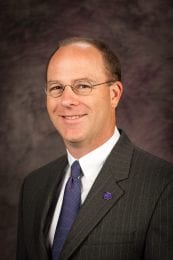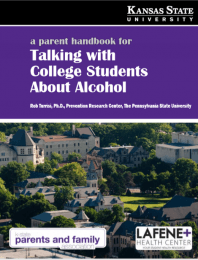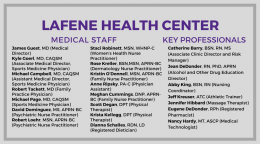
K-State PFA Intern Sadie Polson recently sat down with Jim Parker, Director of Lafene Health Center, K-State students’ health and wellness facility. Conveniently located at 1105 Sunset Avenue, across the street from Marlatt Hall and the Kramer Dining Center, Lafene is focused on providing students with a cost-effective, physician-directed healthcare experience.
K-State PFA Intern Sadie Polson recently sat down with Jim Parker, Director of Lafene Health Center, K-State students’ health and wellness facility. Conveniently located at 1105 Sunset Avenue, across the street from Marlatt Hall and the Kramer Dining Center, Lafene is focused on providing students with a cost-effective, physician-directed healthcare experience.
PFA: Thank you for visiting with us today, Jim! Tell us about the range of services your staff provides to K-State students.
Jim: Lafene Health Center (LHC) is a fully accredited outpatient health center that offers a wide range of health and wellness resources. These resources, both clinical and academic, are available to eligible students. Clinical offerings include primary care/family practice medicine, sports medicine, dermatology, women’s and men’s health, mental health medication management, ADHD testing, physical therapy, athletic training, allergy and immunization services, foreign travel consultations, laboratory services, and a full-service pharmacy. This fall, LHC will initiate massage therapy services for eligible students, faculty, and staff.
Support services offered through LHC programming include alcohol and drug education and certified peer education from the WellCAT Ambassadors. We also provide CPR training for students, faculty, and staff.
Finally, LHC’s Health Promotion Department teaches two classes students may take for university general education credits. The courses are “Peer Health Education and Leadership” (EDCEP360) and “Healthful and Safe College Life” (EDCEP103). In addition to these courses, LHC provides various opportunities for students in pre-health fields to observe, shadow, and intern with medical staff for a direct experience in the delivery of healthcare. To protect confidentiality and uphold the highest standards of healthcare practice, all student observations, shadowing, and intern engagements are by appointment and require prior approval from LHC Administration and potentially academic departments as well.
PFA: As a current student, I’m surprised by the variety of services available to students. It’s comforting to know that I can find all these services without needing to leave campus. With all these services, you must need quite a variety of professional staff. Tell us about the team of professionals who are available to students.
Jim: LHC’s professional staff, including doctors, nurse practitioners, a physician assistant, registered nurses, physical therapists, and a registered dietitian are highly regarded and diverse in their education, training, and healthcare interests. As previously mentioned, the scope and width of our staff aligns itself well with the student population at Kansas State University.
PFA: Wow, we are so fortunate to have such a talented and experienced team on our campus! Throughout the year, we hear from parents who have received a call or text from their student sharing that they are ill. We appreciate parents who want to help direct their student where to go for assistance. Do students need an appointment or do they walk-in?
Jim: The scheduling philosophy at LHC is to provide the greatest level of access for the most amount of people as applied to the appropriate scope of practice. This system also takes into account the severity of the student’s health condition. Our first two preferences would be that ill students either schedule an appointment through our secure/private patient portal or they call and speak with one of our registered triage nurses. These nurses use a nationally recognized set of triage standards to determine the immediacy of the situation and whether the student needs to be seen immediately. Appointment slots are reserved daily for patients needing to have access to our services due to a medically urgent condition.
Since we are not an in-patient facility and predominantly have daytime and limited weekend hours, we contracted with a nationally recognized after-hours nurse line (phone service) in 2017. This service is provided at no cost to the students and helps to keep their cost down as much as possible.
PFA: How many students do you see throughout the year?
Jim: This is a challenging question given the wide variety of ways in which we engage students. However, over the past five years we have had between 45,000 and 55,000 student visits to LHC annually. Please keep in mind that this number does not necessarily take into account engagements with students outside of the health center. Another interesting note is that we estimate greater than 90% of our visits occur during the spring and fall semesters each year.
PFA: Do you accept health insurance? What if a student doesn’t have health insurance?
Jim: LHC contracts with many health insurance providers and we file insurance claims electronically for all of the insurance companies we are contracted with. Recent data from fiscal year 2017 revealed that approximately 85% of patients visiting LHC had active health insurance coverage. Two notable exceptions are that we do not contract with Medicaid or Medicare.
Students who pay a privilege fee at the beginning of each semester as part of the their tuition have access to the services that we offer. While many types of visits to LHC do not result in a charge to the patient (i.e. consultative services with a doctor or nurse), certain procedures, services, and products may incur a charge. For students who do not have access to health insurance or have insurance with high deductibles, we make great effort to keep our costs very low. LHC is not designed to be “profitable;” rather, we are here to provide access to high quality, affordable outpatient healthcare services on the Kansas State University – Manhattan campus.
 PFA: During summer orientation and enrollment, you shared a new resource called the Parent Guide to Alcohol. What can you tell us about this resource? How might parents use it?
PFA: During summer orientation and enrollment, you shared a new resource called the Parent Guide to Alcohol. What can you tell us about this resource? How might parents use it?
Jim: A Parent Handbook for Talking With College Students About Alcohol is a nationally recognized resource developed by Robert Turrisi, Ph.D., Prevention Resource Center at The Pennsylvania State University. Its purpose is to help parents engage with their child or children about the potential consequences of alcohol when they are away at college. This Guide is the only evidence-based, parent-based intervention that has undergone 10 well-controlled clinical trials. Furthermore, the contents and research have been vetted and reviewed by the Surgeon General of the United States. LHC and the K-State Parent and Family Association has branded this easy to read handbook as well as provided a listing of useful campus and community resources and services specific to K-State students. Additionally, this program has the full support of Dr. Pat Bosco, K-State’s Vice President for Student Life and Dean of Students.
PFA: Is there anything in the guide that might surprise parents?
Jim: The Parent Guide to Alcohol is a very practical resource that can assist parents in continuing to help their children after they have left for college. The Guide strongly encourages parental honesty when engaging in discussions about alcohol. This is particularly evident when the dialogue goes to the parents’ activities with alcohol in their younger years. The honesty and vulnerability of the parents can be used as powerful tools to better prepare the student when they are confronted with decisions regarding alcohol.
PFA: As healthcare professionals, you see a lot of students. What advice would you like to share with parents and families about student health?
Jim: LHC is a tremendous health and well-being resource readily available for our students. We are committed to providing accessible, high quality, affordable healthcare in a structured and accredited environment. It is in the best interest of our students to know what we offer and then take advantage of the services we provide at relatively low costs.
PFA: What is one thing you want all parents and families to know about Lafene Health Center?
Jim: LHC genuinely cares for our students and patients. Over the last 5 years, we have made great efforts to better engage with students and have assembled exceptional providers and nurses to attend to the health and well-being needs of our students.

PFA: What is the best kept secret about Lafene Health Center?
Jim: There are numerous great things about LHC that many students, parents, and others may not be aware of. An often neglected component of the services we provide relates to student experience. In the past year LHC has had approximately 25-30 students engaging with our healthcare providers as observers/interns in the clinical setting. This provides an incredible opportunity for many pre-health students to determine if they genuinely have an interest in pursuing healthcare as a career choice before having to pay for it. We believe this is valuable as they prepare emotionally, mentally, physically, and financially to embark on a post-graduate degree in a health-related field.
PFA: Jim, your enthusiasm for Lafene Health Center is evident in all that you do. I can’t wait to tell all my friends about what I learned today. I’m confident parents and families will appreciate this information, too. Thank you for your time!
